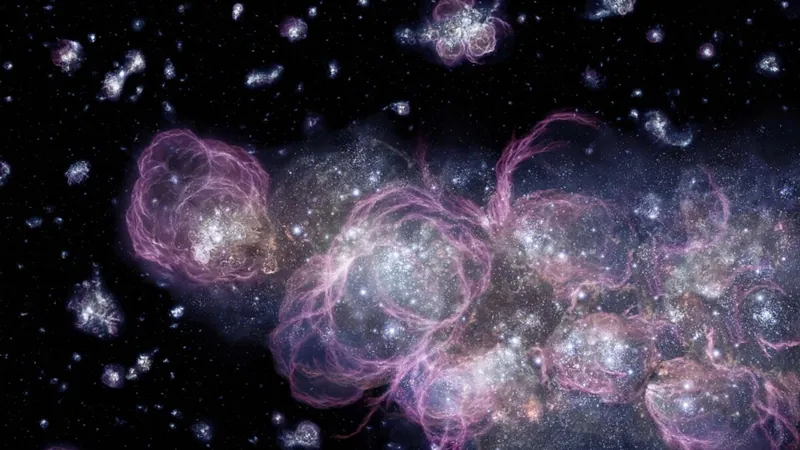
Revolutionary Theory Challenges Our Understanding of the Early Universe
2025-07-21
Author: Jessica Wong
Unveiling a New Perspective on Cosmic Origins
After the Big Bang, the universe underwent an astonishing expansion, a phenomenon termed cosmic inflation. This well-accepted theory suggests that explosive growth generated tiny quantum fluctuations, which eventually formed galaxies. However, its reliance on speculative assumptions has led physicists to seek alternatives.
A Breakthrough from Barcelona
Enter theoretical physicist Raúl Jiménez from the University of Barcelona, who has proposed a groundbreaking alternative. Published in *Physical Review Research*, his theory aims to simplify the overly complex parameters in current cosmic models, making it easier for scientists to reach a consensus.
The Basics of the New Model
Jiménez's approach hinges on the notion of a de Sitter space—a flat vacuum governed by general relativity. By viewing the early universe through this lens, alongside principles from quantum mechanics, the theory suggests that initial energy, specifically from the Big Bang, triggered quantum fluctuations that birthed gravitational waves. These waves then infused the universe with density variations that ultimately coalesced into stars and galaxies.
Reducing Complexity in Theories
Critics of inflationary theory argue that its many adjustable parameters, such as the inflaton, complicate its validity. Jiménez’s model, however, eliminates these extra variables, relying solely on the foundational principles of physics. Arthur Kosowsky, a cosmologist at the University of Pittsburgh, notes this simplicity is a significant advantage, emphasizing that fewer arbitrary elements lead to more robust models.
Falsifiability: A Double-Edged Sword
Jiménez contends that his new theory is 'fully falsifiable,' meaning it can be tested against observational data. While this strength is crucial for scientific validation, it also presents a challenge—what if nature doesn't adhere to this new framework?
A Call for Simplicity and Efficiency
Kosowsky appreciates the pursuit of a theory where inflation emerges naturally from fundamental physics rather than depending on added, speculative elements. This elegance could lead to clearer predictions that can be tested and compared to actual observations.
Mixed Reactions from Cosmology Experts
Andrew Liddle, an expert from the Institute of Astrophysics and Space Sciences, describes Jiménez’s theory as 'interesting and novel,' while noting that its simplicity could become a potential weakness. He, along with others, acknowledges the ongoing discomfort within the cosmology community regarding traditional inflation theories.
A Time for Innovation and Discovery
With numerous questions challenging existing models—such as dark energy and the Hubble tension—Jiménez’s proposal adds to the vibrant discourse in cosmology. As Liddle succinctly puts it, the scientific community is rich with novel ideas, hinting at an exciting era of discovery.
A Golden Age for Cosmology
Jiménez asserts we are in a 'golden age of cosmology,' marked by an explosion of data and enhanced analysis quality. As the scientific community forges ahead, the coming years promise to be filled with groundbreaking ideas and revelations about our universe’s tumultuous beginnings.



 Brasil (PT)
Brasil (PT)
 Canada (EN)
Canada (EN)
 Chile (ES)
Chile (ES)
 Česko (CS)
Česko (CS)
 대한민국 (KO)
대한민국 (KO)
 España (ES)
España (ES)
 France (FR)
France (FR)
 Hong Kong (EN)
Hong Kong (EN)
 Italia (IT)
Italia (IT)
 日本 (JA)
日本 (JA)
 Magyarország (HU)
Magyarország (HU)
 Norge (NO)
Norge (NO)
 Polska (PL)
Polska (PL)
 Schweiz (DE)
Schweiz (DE)
 Singapore (EN)
Singapore (EN)
 Sverige (SV)
Sverige (SV)
 Suomi (FI)
Suomi (FI)
 Türkiye (TR)
Türkiye (TR)
 الإمارات العربية المتحدة (AR)
الإمارات العربية المتحدة (AR)